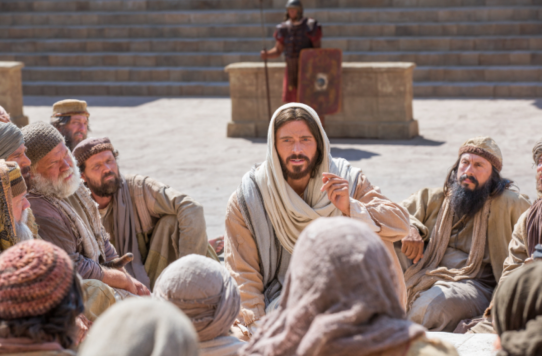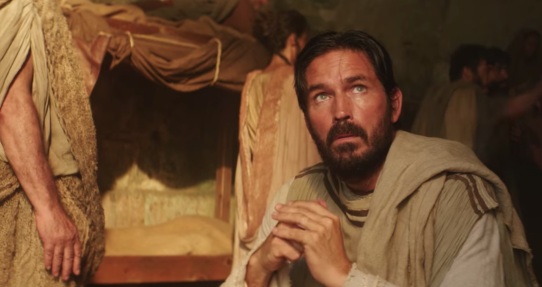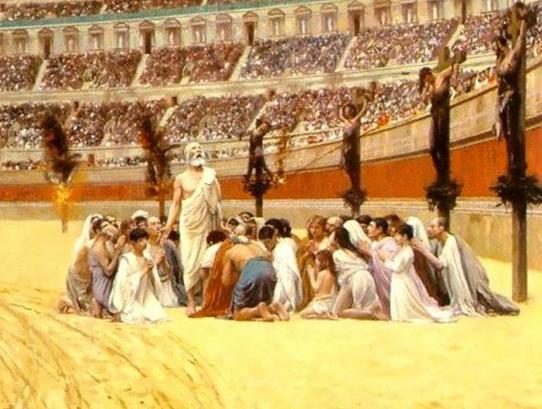
Then He said, “Do not lay a hand on the boy or do anything to him. For now I know that you fear God, since you have not withheld your only son from Me.” Abraham looked up and saw a ram caught in the thicket by its horns. So Abraham went and took the ram and offered it as a burnt offering in place of his son. And Abraham named that place The Lord Will Provide, so today it is said: “It will be provided on the Lord’s mountain.” (Genesis 22:12-14)
In the Book of Genesis, we see Abraham offering up his son as a substitutionary sacrifice, on Mount Moriah, the same place where Jesus was crucified. This sacrifice was a foreshadowing of the event in Jesus’ life by which He would do His work. The phrase we translate “The Lord will provide” is Jehovah Jireh or “The Lord our provider.”
Does the same One who provided a ram in the thicket for Abraham provide for Christians today?
2021 update: Half of America in or near poverty / Nation of Change, February 22, 2021

The facts and numbers from numerous sources reflect the reality of deprivation in America, and help to confirm what has been called the “sharpest rise in the U.S. poverty rate since the 1960s.”
The Washington Post summarizes: “According to Nielsen data, the American Payroll Association, CareerBuilder and the National Endowment for Financial Education, somewhere between 50 percent and 78 percent of employees earn just enough money to pay their bills each month….[this was] before the coronavirus pandemic….[since then] the number of first-time unemployment claims has exceeded 1 million per week, an unprecedented number in U.S. history.”
There’s much more evidence of Americans in trouble. An NPR review states that “survey after survey for years has found that most people in the U.S. live paycheck to paycheck.” One of these is a survey reported by CNBC, which concluded that “63 percent of Americans have been living paycheck to paycheck since Covid hit.” Both Schwab’s 2020 Modern Wealth Survey and a recent Harris Poll found that a sizable majority of Americans are suffering financial stress during the pandemic. The American Psychological Association concurs. In Bankrate’s latest polling numbers, 6 out of 10 Americans would be unable to afford an unexpected $1,000 expense.
With month-to-month survival preoccupying most Americans, retirement savings are far beyond reach. Schwab’s Wealth Survey found that Americans need a net worth of $655,000 to be “financially comfortable.” According to Credit Suisse, NOBODY in the bottom half of North America has more than about ONE-TENTH of that retirement amount.
Soaring Cost of Food Is Forcing Families to Scrimp at the Dinner Table / Bloomberg Businessweek, August 17, 2021

Whether at supermarkets, corner stores, or open-air markets, prices for food have been surging in much of the world, forcing families to make tough decisions about their diets. Meat is often the first to go, ceding space to less expensive proteins such as dairy, eggs, or beans. In some households, a glass of milk has become a luxury reserved only for children; fresh fruit, once deemed a necessity, is now a treat.
Food prices in July were up 31% from the same month last year, according to an index compiled by the United Nations’ Food and Agriculture Organization. A portion of the rise is transitory, fueled by supply chain disruption and extreme weather. Although some of the bottlenecks caused by the pandemic show signs of abating, structural factors such as climate change and China’s strong appetite for imports will likely endure.
The sustained increase in prices for basic staples is making some governments nervous. Russia, one of the world’s top grain exporters, began taxing wheat exports in February to stem rising prices at home, while Argentina in May temporarily banned beef sales abroad for the same reason. The surge has stirred memories of 2008 and 2011, respectively, when spikes triggered food riots in more than 30 nations across Africa, Asia, and the Middle East and contributed to political uprisings in the Arab Spring. “Food fundamentally touches all of us,” says Cullen Hendrix, nonresident senior fellow at the Peterson Institute for International Economics, a Washington-based think tank. “Everybody knows about the price of food and knows when it’s increasing, regardless of whether or not they have any interest in politics.” But for most households, relief is scant.
Many of the people who are suffering through these hard times are Christians. Shouldn’t fully-devoted followers of Jesus Christ be free of poverty and hunger?
Prosperity theology (sometimes referred to as the prosperity gospel, the health and wealth gospel, the gospel of success, or seed faith) is a religious belief among some Protestant Christians that financial blessing and physical well-being are always the will of God for them, and that faith, positive speech, and donations to religious causes will increase one’s material wealth.

Prosperity theology has been criticized by leaders from various Christian denominations, including within some Pentecostal and charismatic movements, who maintain that it is irresponsible, promotes idolatry, and is contrary to the scripture. Secular as well as some Christian observers have also criticized prosperity theology as exploitative of the poor. The practices of some preachers have attracted scandal and some have been charged with financial fraud.

Prosperity theology views the Bible as a contract between God and humans: if humans have faith in God, he will deliver security and prosperity. The doctrine emphasizes the importance of personal empowerment, proposing that it is God’s will for his people to be blessed. The atonement (reconciliation with God) is interpreted to include the alleviation of sickness and poverty, which are viewed as curses to be broken by faith. This is believed to be achieved through donations of money, visualization, and positive confession.

It was during the Healing Revivals of the 1950s that prosperity theology first came to prominence in the United States, although commentators have linked the origins of its theology to the New Thought movement which began in the 19th century. The prosperity teaching later figured prominently in the Word of Faith movement and 1980s televangelism. In the 1990s and 2000s, it was adopted by influential leaders in the Pentecostal movement and charismatic movement in the United States and has spread throughout the world.

What does the Holy Bible say about it?

So don’t worry, saying, ‘What will we eat?’ or ‘What will we drink?’ or ‘What will we wear?’ For the idolaters eagerly seek all these things, and your heavenly Father knows that you need them. But seek first the kingdom of God and His righteousness, and all these things will be provided for you. (Matthew 6:31-33)
Mainstream evangelicalism has consistently opposed prosperity theology as heretical, and prosperity ministries have frequently come into conflict with other Christian groups, including those within the Pentecostal and Charismatic movements. Critics of the movement assail promises made by its leaders, arguing that the broad freedom from problems they promise is irresponsible.

I have told you these things so that in Me you may have peace. You will have suffering in this world. Be courageous! I have conquered the world. (John 16:33)
Prosperity theology has been opposed for not adequately explaining the poverty of the Apostles. For instance, some theologians believe that the life and writings of Paul the Apostle, who is believed to have experienced significant suffering during his ministry, are particularly in conflict with prosperity theology.

We give no opportunity for stumbling to anyone, so that the ministry will not be blamed. But as God’s ministers, we commend ourselves in everything:
by great endurance, by afflictions,
by hardship, by difficulties,
by beatings, by imprisonments,
by riots, by labors,
by sleepless nights, by times of hunger,
by purity, by knowledge,
by patience, by kindness,
by the Holy Spirit, by sincere love,
by the message of truth,
by the power of God;
through weapons of righteousness
on the right hand and the left,
through glory and dishonor,
through slander and good report;
as deceivers yet true;
as unknown yet recognized;
as dying and look—we live;
as being disciplined yet not killed;
as grieving yet always rejoicing;
as poor yet enriching many;
as having nothing yet possessing everything. (2 Corinthians 6:3-10)
In fact, the history of Christianity is not of prosperity, but of martyrs, according to the Bible.
It begins in Acts with the stoning of the apostle Stephen. Later in the book of Acts, the apostle Paul calls Stephen Jesus’ martyr. It says in Acts 22:20, “And when the blood of your martyr Stephen was shed, I stood there giving my approval and guarding the clothes of those who were killing him.”

However, the history of Christian martyrs does not end with Stephen’s death. During the first century after Jesus’ death nearly all of his disciples suffered martyrdom for His sake. James the son of Zebedee was beheaded in approximately 44 A.D. Philip was crucified in 54 A.D. Matthew was killed with a halberd, an ax-like weapon, in 60 A.D. James, who is thought to be the brother of Jesus, was beaten to death, Matthias was beheaded, Andrew was crucified, Mark was torn to pieces, and Peter was crucified upside down. Jude, Bartholomew, and Thomas were also martyred. Paul suffered martyrdom in Rome where he was beheaded. Other early apostles Luke, Barnabas, Timothy, and Simon were also killed for the sake of Christ.

The history of Christian martyrs does not end with the death of the disciples. Thousands willingly gave their lives under Roman persecution by the emperors Nero, Domitian, Trajan, Marcus Aurelius, Maximus, Decius, Valerian, Aurelian, and Diocletian. The Roman persecution lasted well into the fourth century A.D. and did not end until Emperor Constantine declared Christianity the official religion of his empire. During the same time period, in Persia, where the Gospel had quickly spread, many others were also martyred for their faith.

Unfortunately, the history of Christian martyrs does not end with Constantine. Throughout the following centuries and up until present time, Christians have, and continue to, suffer martyrdom. This persecution has come by means of other Christians, other faiths, and political powers. This martyrdom gives testimony to the verse in John 15: 20-21 where Jesus tells His disciples, “Remember the words I spoke to you: ‘No servant is greater than his master.’ If they persecuted me, they will persecute you also. If they obeyed my teaching, they will obey yours also. They will treat you this way because of my name, for they do not know the One who sent me.”
So, in light of this, what can we do about any lack of resources?
* Read the Holy Bible

Daily Bible reading is an excellent habit that can benefit every Christian in many ways. When we read the Bible, we’re fed by God’s Word and supplied for our Christian life. Jesus mentioned this in Matthew 4:4 when He said, “Man shall not live on bread alone, but on every word that proceeds out through the mouth of God.”
When we eat physical food, we’re supplied with the nutrients we need to live and be healthy. We get the energy to go to work, exercise, and spend time with family and friends. Conversely, when we skip a meal, we feel weak, tired, and even grumpy. And if we keep missing meals, we become susceptible to even greater problems, like illness.
Similarly, when we eat spiritual food we’re supplied to live our Christian life. But when we’re away from God’s Word for a while, we can become spiritually weak, tired, and “grumpy,” or, unable to handle difficulties well. We become more susceptible to temptation, doubts, and other kinds of spiritual sickness. We simply don’t have the means to cope with the many challenges that come into our lives as believers.
What if we don’t understand what we’re reading? We may wonder whether we should keep reading the Bible. Or maybe we’re discouraged because by the afternoon we’ve forgotten what we read in the morning. Should we keep on reading, even when we don’t remember much?
The answer is, yes, definitely. This is because a great benefit of reading God’s Word is that it washes us.
We may understand that we need the washing of our sins by the Lord’s blood, but we also need to realize that we need the washing away of our natural life by His life. How do we get this washing of life? The washing water of life is in God’s Word. So even if we don’t remember or fully understand what we read, our daily Bible reading still washes us from so many negative things.
Our faith is based not on our imaginations or concepts but on the Word of God, so it’s critical that we as Christians all know what God’s Word says. By reading the Word regularly, we’ll eventually read through the entire Bible and gain a basic knowledge of God and the things of God.
* Pray

He was praying in a certain place, and when He finished, one of His disciples said to Him, “Lord, teach us to pray, just as John also taught his disciples.”
He said to them, “Whenever you pray, say:
Father,
Your name be honored as holy.
Your kingdom come.
Give us each day our daily bread.
And forgive us our sins,
for we ourselves also forgive everyone
in debt to us.
And do not bring us into temptation.
But deliver us from the evil one” (Luke 11:1-4)
.

.
Lord, I bring my requests before your throne, and…
I ask you, Father, in Jesus’ name:
Most assuredly, I say to you, whatever you ask the Father in My name He will give you. Until now you have asked nothing in My name. Ask, and you will receive, that your joy may be full. (John 16:23-24)
I ask, believing that I have received the answer to my request:
Therefore I say to you, whatever things you ask when you pray, believe that you receive them, and you will have them. (Mark 11:24)
I ask for things that please you:
Now this is the confidence that we have in Him, that if we ask anything according to His will, He hears us. And if we know that He hears us, whatever we ask, we know that we have the petitions that we have asked of Him. (1 John 5:14-15)
I ask while obeying your commands:
And whatever we ask we receive from Him, because we keep His commandments and do those things that are pleasing in His sight. (1 John 3:22)
I ask that the Son may bring glory to the Father:
And whatever you ask in My name, that I will do, that the Father may be glorified in the Son. If you ask anything in My name, I will do it. (John 14:13-14)
I ask, while remaining in Jesus:
If you abide in Me, and My words abide in you, you will ask what you desire, and it shall be done for you. (John 15:7)
I ask, because you care for me:
Therefore humble yourselves under the mighty hand of God, that He may exalt you in due time, casting all your care upon Him, for He cares for you. (1 Peter 5:6-7)
I ask, because you will meet all my needs:
And my God shall supply all your need according to His riches in glory by Christ Jesus.(Philippians 4:19)
I ask, while confessing and repenting of my sin:
If I regard iniquity in my heart, the Lord will not hear. (Psalm 66:18)
I ask, while forgiving all others who have sinned against me:
And forgive us our debts, as we forgive our debtors. (Matthew 6:12)
I ask, while offering a sacrifice of praise:
Therefore by Him let us continually offer the sacrifice of praise to God, that is, the fruit of our lips, giving thanks to His name. (Hebrews 13:15)
.

Pray this daily, and the Lord will Provide!

.
If you are not sure that you are saved, you can accept Christ into your life right now, by praying:
“Lord Jesus, I believe you are the Son of God. Thank you for dying on the cross for my sins. Please forgive my sins and give me the gift of eternal life. I ask you in to my life and heart to be my Lord and Savior.”
Source: Raptureandendtimes.com
 RSS Feed
RSS Feed















 August 26th, 2021
August 26th, 2021  Awake Goy
Awake Goy  Posted in
Posted in  Tags:
Tags: 













